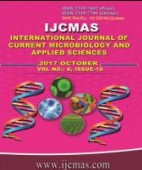


 National Academy of Agricultural Sciences (NAAS)
National Academy of Agricultural Sciences (NAAS)

|
PRINT ISSN : 2319-7692
Online ISSN : 2319-7706 Issues : 12 per year Publisher : Excellent Publishers Email : editorijcmas@gmail.com / submit@ijcmas.com Editor-in-chief: Dr.M.Prakash Index Copernicus ICV 2018: 95.39 NAAS RATING 2020: 5.38 |
Achieving durability of resistance and minimizing yield losses due to Leaf rust, caused by Puccinia triticina Eriks, in wheat has been one of the major objective of breeding programs. The slow rusting genes that are quantitatively inherited, are known to confer durable type of resistance. In present investigation our objective was to study the effects Lr34 and Lr68 genes on minimizing grain yield losses using backcross segregating populations of the cross GW322 X PARULA. For this comparison of grain yield was made in protected and non-protected treatments. Experimental materials were screened with linked molecular markers to detect the presence of genes conferring resistance to leaf rust. Overall yield losses in presence of slow rusting genes Lr34, Lr68 and in combination of both Lr34 and Lr68 were 14.98 %, 16.36 % and 13.27 % respectively which was comparatively much lower than yield losses in absence of both the slow rusting genes (33.15%). Yield losses were associated mainly with the reduction in grain yield per plant and thousand grain weight. These plants with both the genes in combination and having lower yield losses are the potential lines for further development of varieties. We conclude that although the presence of slow rusting genes which is linked with leaf tip necrosis of adult plants, causing reduction in net photosynthetic area could provide substantial protection to grain yield in high disease pressure.
 |
 |
 |
 |
 |